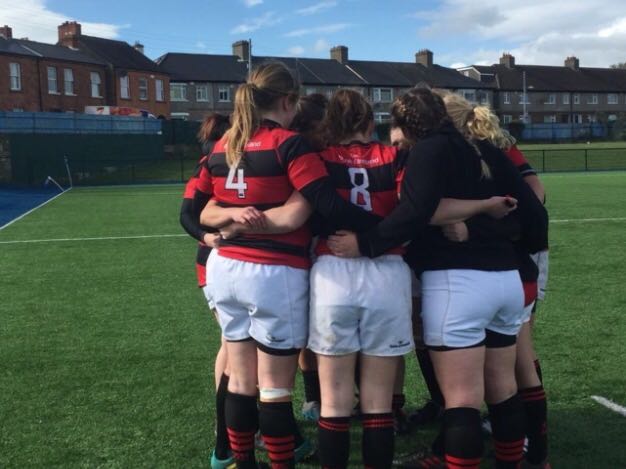There was a fleeting moment, just after the full-time whistle of yesterday’s Paul Cusack Cup final, when Dublin University Football Club (DUFC) Women’s coach Colm Hogan found himself briefly alone on his side’s 22, looking on at the celebrations of the victorious Port Dara Falcons side. In a game characterised by some questionable calls from the referee, there was plenty to reflect on for the defeated coach after a 24-5 victory for Falcons.
Following a testing campaign last year – the side battled relegation for much of the season – this year’s resurgence has been impressive for anyone familiar with Trinity sport. Taking to the field in Donnybrook yesterday, DUFC had already surpassed all expectations placed before them at the beginning of the season, with only a talented Falcons side standing between them and a rare cup triumph for any Trinity side.
There were nerves on both sides from the opening whistle, with neither team seizing the initiative. A gale force wind, coupled with the unfamiliar terrain of Donnybrook’s 3G pitch, was forcing handling errors, while issues in the lineout ensured that much of the early play was centred around midfield. Despite this, DUFC soon got to grips with the foreign conditions, and began to test the Falcons side. The ever-dependable Niamh O’Kelly Lynch was finding some joy down the right wing, as quick hands helped her and centre Aine Castles combine to probe what would prove to be a stern Falcons defence.
It became clear midway through the first half, however, that the game would be a stop-start affair. The referee was not allowing the play to flow, frequently calling players back, often for the most minor and innocuous of infractions. His interventions created a tense atmosphere, with many spectators becoming restless as the game’s momentum was repeatedly checked. Breaking the lethargic pace of the game, Falcons eventually opened the scoring midway through the first half. Phases of pressure allowed them to batter the DUFC line, before taking advantage of a gap that had opened in the Trinity defence.
From here the Falcons slowly took control of the game, showing creativity in midfield and causing more and more problems for DUFC. O’Kelly Lynch and Tara Coleman continuing to test Falcons’ defence on the right wing, but Trinity seemed to lack the incisive edge they showed in the semi-finals.
Falcons’ hard work placed severe pressure on the Trinity defence and it wasn’t long before they crossed the whitewash once again. Trinity, however, were let off the hook, the referee disallowing the try much to the disbelief of those on the Falcons’ bench. The Kildare side responded excellently, stretching their lead further with a converted try on the stroke of half-time and going into the break 12-0 up.
Trinity emerged from the dressing room with a new ferocity, leaving Port Dara’s defensive line struggling to keep them at bay. Minutes later, Trinity’s Honor MacNamara became the first casualty of a card-happy referee who would eventually send four players to the sin bin, in a display that left almost everyone on the touchline shaking their head in bemusement. DUFC, however, were not deterred and, following a Falcons yellow card, managed to reduce the deficit after Niamh O’Kelly Lynch slipped through the line and crashed over to bring the score to 12-5.
For a brief spell following this, the momentum swung Trinity’s way and they were very close at different points to cracking a watertight Falcons defensive line. However, another debatable yellow card, this time issued to Castles, checked their resurgence, and moments later Falcons made the most of their numerical advantage by smashing through a depleted Trinity defence and touching down for a third try. A fourth followed soon after, making the scoreline seem a lot less balanced than the game was. The game finished 24-5 and the trophy went to Port Dara, leaving DUFC to rue their profligacy and wonder at what could have been were it not for a bizarre set of refereeing decisions.
Making the final of the Paul Cusack Cup, as well as the Leinster Division Three final, is a phenomenal achievement for a Trinity team that just about survived relegation last year. They look like a solid unit, well trained and close-knit. With plenty of experience playing in cup finals, there is every chance that next year could see silverware go DUFC’s way.







